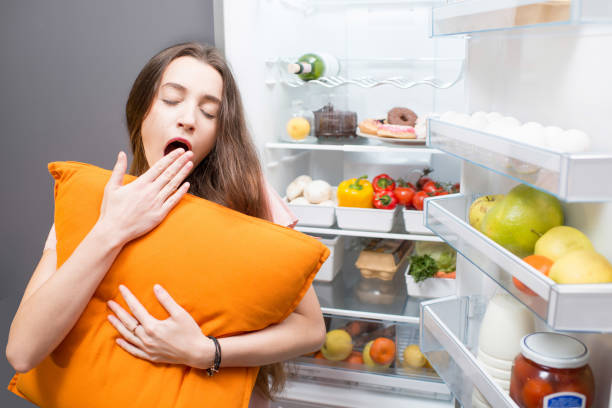Experts recommend against eating food that is heavy before time to go to bed. The food we consume does not just provide energy but also affects how well we sleep. The reason is that our body requires a few hours to digest food. Furthermore, if the food you eat is oily and heavy, it can adversely affect your stomach and sleep.
The importance of macro and micronutrients
The food we consume is generally broken down into macro and micronutrients. Macronutrients comprise proteins, carbohydrates, and fats, whereas micronutrients contain minerals and vitamins.
After a meal, the body produces insulin as a response to food. As a result of the hormone, amino acids are taken up by muscles and the brain.
“Tryptophan (precursor for melatonin the hormone that induces sleep) along with other amino acids are absorbed by the brain. They’re responsible for the rise in the production of melatonin. This slows down brain activity and increasing the activity of the sleep-promoting center,” explains Dr Satyanarayana Mysore, HOD pulmonology, consultant in sleep medicine, and lung transplant doctor, Manipal Hospitals Bengaluru at an event in the Edge of Nutrition Summit 2023 hosted by Happiest Health.
He said that the production and control of hormones depend on the nutrients we consume.
Certain micronutrients such as zinc, magnesium, and specific vitamins have been proven to improve sleep. “In certain sleep disorders like restless legs syndrome, we often check for the iron and magnesium levels and supplement in the case of deficiency,” stated another panelist on the summit, Dr. Vivek Anand Padegal, Director and senior consultant of sleep and pulmonary services, Fortis Hospital, Bengaluru.
Do you need to consider taking melatonin supplements if you have trouble sleeping?
The simple answer is that there isn’t. Melatonin is naturally produced through the pineal gland (in the brain) in response to a dark and dim environment. Our ancestors were trained by nature through the ages and went to sleep when the night sky changed to dark in the evening. Our circadian activity cycle was shaped according to the signals of nature, according to Dr Mysore.
But, melatonin supplementation is not new. We understand what melatonin can do in the last few years (50-60 decades). Therefore, “Supplementation if any has to be for a sound scientific purpose, clinical indications are there,” said Dr. Mysore.
Dr. Padegal explained that melatonin supplementation alone will not help you get back into your regular sleeping pattern. He said it must be coupled with exposure to sunlight outside, which helps to ingrain the effects of this.
Do you need to eat food before you go to bed?
It is standard practice for many people to fall asleep shortly after eating. Dr. Padegal is famous for saying, “Eat breakfast with the regal style and have dinner like a pauper’.
The doctor explained, “Heavy meals toward the final hours of the day cause weight gain It also increases the length of your sleep (time required to get to sleep) also reduces your quality of sleep. This results in hypertension, obesity and a myriad of other issues. It’s a vicious circle.”
“One requires a gap of between 2-4 hours between meals and bed. Therefore, as the day goes on, it is necessary to reduce the amount of saturated fats and carbohydrates, and toward the end of the day, one should eat some food that has higher fiber and lower carbs,” added Padegal.
Takeaways
- The food we eat plays a vital role in getting high-quality sleep.
- The macro and micronutrients in our diet play a role in controlling hormones that help or hinder our sleep.
- Supplements to improve sleep should be taken only after doctor consultation.
- Keeping the gap at least 2 hours after eating and before bed is essential.

